The Role of Tourism Development at Thomas Cook: An Analysis
VerifiedAdded on 2021/02/20
|23
|5262
|131
Report
AI Summary
This research project examines the role of tourism development practices in enhancing the international identity of Thomas Cook, a British travel organization. The report begins with an introduction to tourism development, its background, research problem, aims, objectives, and research questions. The study aims to analyze the concept of tourism development, identify various practices, and determine their contribution to improving Thomas Cook's international identity. The literature review explores the concept of tourism development and its impact on international identity. The methodology section outlines the research design, which includes both primary and qualitative research methods. The report presents data findings, analysis, and discussions, followed by conclusions, recommendations, and anticipated limitations. The project also includes a time-framework using a Gantt chart and work breakdown structure to manage the project's timeline and deliverables. The research highlights the importance of tourism development for business growth and the need for Thomas Cook to implement effective strategies to enhance its international presence. It addresses the benefits and challenges of tourism development, emphasizing the role of various practices in creating opportunities and contributing to the economic growth of the nation.
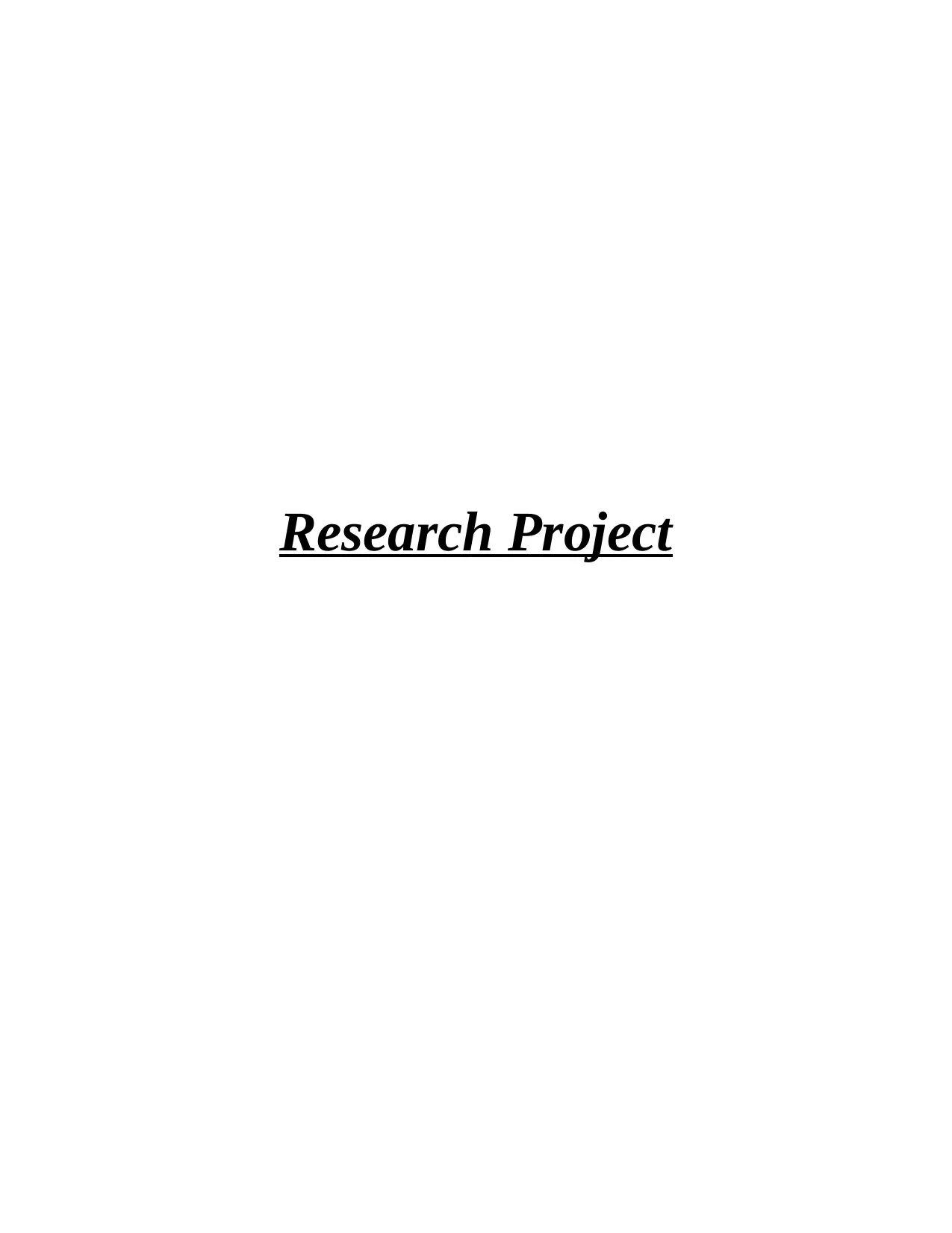
Research Project
Paraphrase This Document
Need a fresh take? Get an instant paraphrase of this document with our AI Paraphraser
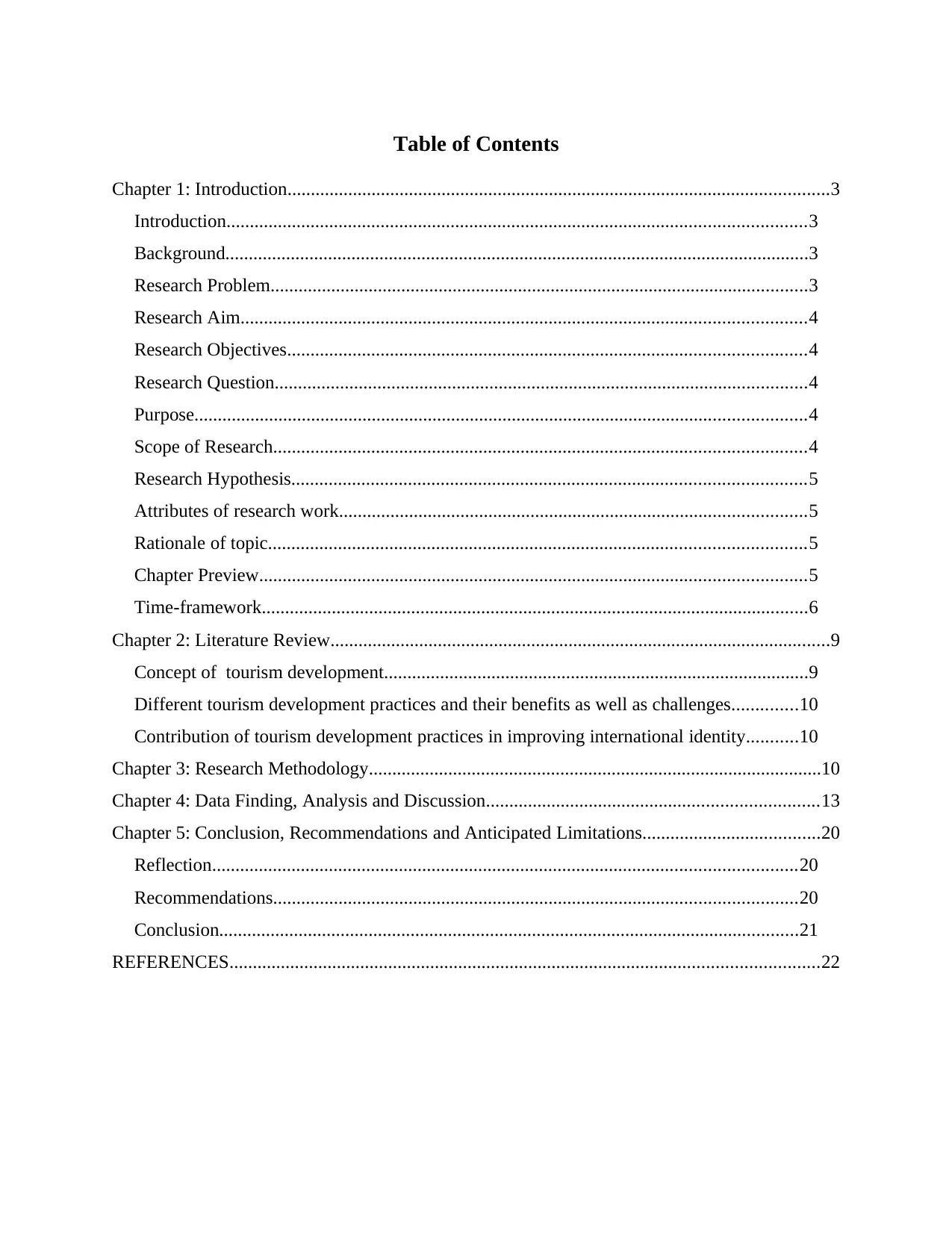
Table of Contents
Chapter 1: Introduction....................................................................................................................3
Introduction............................................................................................................................3
Background.............................................................................................................................3
Research Problem...................................................................................................................3
Research Aim.........................................................................................................................4
Research Objectives...............................................................................................................4
Research Question..................................................................................................................4
Purpose...................................................................................................................................4
Scope of Research..................................................................................................................4
Research Hypothesis..............................................................................................................5
Attributes of research work....................................................................................................5
Rationale of topic...................................................................................................................5
Chapter Preview.....................................................................................................................5
Time-framework.....................................................................................................................6
Chapter 2: Literature Review...........................................................................................................9
Concept of tourism development...........................................................................................9
Different tourism development practices and their benefits as well as challenges..............10
Contribution of tourism development practices in improving international identity...........10
Chapter 3: Research Methodology.................................................................................................10
Chapter 4: Data Finding, Analysis and Discussion.......................................................................13
Chapter 5: Conclusion, Recommendations and Anticipated Limitations......................................20
Reflection.............................................................................................................................20
Recommendations................................................................................................................20
Conclusion............................................................................................................................21
REFERENCES..............................................................................................................................22
Chapter 1: Introduction....................................................................................................................3
Introduction............................................................................................................................3
Background.............................................................................................................................3
Research Problem...................................................................................................................3
Research Aim.........................................................................................................................4
Research Objectives...............................................................................................................4
Research Question..................................................................................................................4
Purpose...................................................................................................................................4
Scope of Research..................................................................................................................4
Research Hypothesis..............................................................................................................5
Attributes of research work....................................................................................................5
Rationale of topic...................................................................................................................5
Chapter Preview.....................................................................................................................5
Time-framework.....................................................................................................................6
Chapter 2: Literature Review...........................................................................................................9
Concept of tourism development...........................................................................................9
Different tourism development practices and their benefits as well as challenges..............10
Contribution of tourism development practices in improving international identity...........10
Chapter 3: Research Methodology.................................................................................................10
Chapter 4: Data Finding, Analysis and Discussion.......................................................................13
Chapter 5: Conclusion, Recommendations and Anticipated Limitations......................................20
Reflection.............................................................................................................................20
Recommendations................................................................................................................20
Conclusion............................................................................................................................21
REFERENCES..............................................................................................................................22
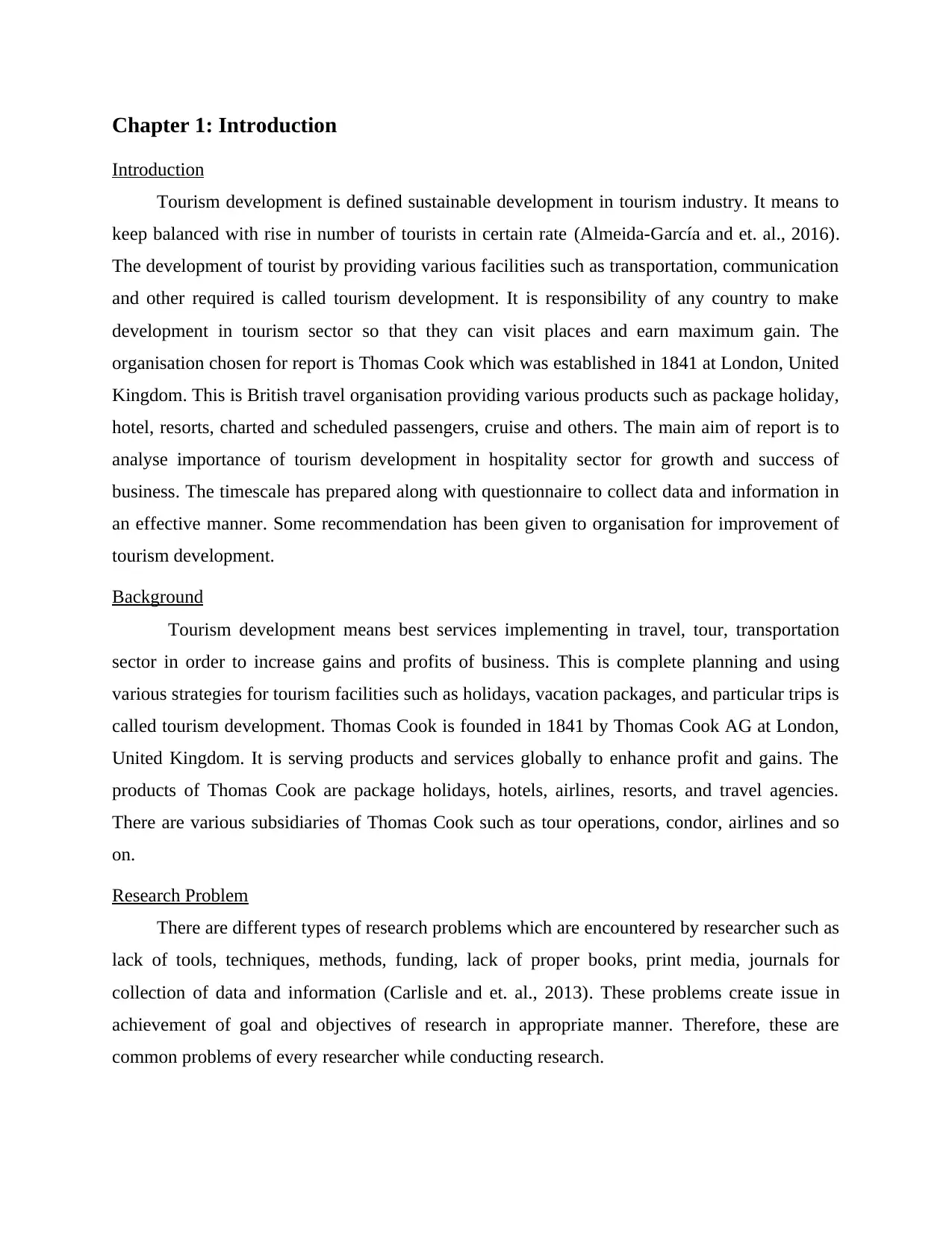
Chapter 1: Introduction
Introduction
Tourism development is defined sustainable development in tourism industry. It means to
keep balanced with rise in number of tourists in certain rate (Almeida-García and et. al., 2016).
The development of tourist by providing various facilities such as transportation, communication
and other required is called tourism development. It is responsibility of any country to make
development in tourism sector so that they can visit places and earn maximum gain. The
organisation chosen for report is Thomas Cook which was established in 1841 at London, United
Kingdom. This is British travel organisation providing various products such as package holiday,
hotel, resorts, charted and scheduled passengers, cruise and others. The main aim of report is to
analyse importance of tourism development in hospitality sector for growth and success of
business. The timescale has prepared along with questionnaire to collect data and information in
an effective manner. Some recommendation has been given to organisation for improvement of
tourism development.
Background
Tourism development means best services implementing in travel, tour, transportation
sector in order to increase gains and profits of business. This is complete planning and using
various strategies for tourism facilities such as holidays, vacation packages, and particular trips is
called tourism development. Thomas Cook is founded in 1841 by Thomas Cook AG at London,
United Kingdom. It is serving products and services globally to enhance profit and gains. The
products of Thomas Cook are package holidays, hotels, airlines, resorts, and travel agencies.
There are various subsidiaries of Thomas Cook such as tour operations, condor, airlines and so
on.
Research Problem
There are different types of research problems which are encountered by researcher such as
lack of tools, techniques, methods, funding, lack of proper books, print media, journals for
collection of data and information (Carlisle and et. al., 2013). These problems create issue in
achievement of goal and objectives of research in appropriate manner. Therefore, these are
common problems of every researcher while conducting research.
Introduction
Tourism development is defined sustainable development in tourism industry. It means to
keep balanced with rise in number of tourists in certain rate (Almeida-García and et. al., 2016).
The development of tourist by providing various facilities such as transportation, communication
and other required is called tourism development. It is responsibility of any country to make
development in tourism sector so that they can visit places and earn maximum gain. The
organisation chosen for report is Thomas Cook which was established in 1841 at London, United
Kingdom. This is British travel organisation providing various products such as package holiday,
hotel, resorts, charted and scheduled passengers, cruise and others. The main aim of report is to
analyse importance of tourism development in hospitality sector for growth and success of
business. The timescale has prepared along with questionnaire to collect data and information in
an effective manner. Some recommendation has been given to organisation for improvement of
tourism development.
Background
Tourism development means best services implementing in travel, tour, transportation
sector in order to increase gains and profits of business. This is complete planning and using
various strategies for tourism facilities such as holidays, vacation packages, and particular trips is
called tourism development. Thomas Cook is founded in 1841 by Thomas Cook AG at London,
United Kingdom. It is serving products and services globally to enhance profit and gains. The
products of Thomas Cook are package holidays, hotels, airlines, resorts, and travel agencies.
There are various subsidiaries of Thomas Cook such as tour operations, condor, airlines and so
on.
Research Problem
There are different types of research problems which are encountered by researcher such as
lack of tools, techniques, methods, funding, lack of proper books, print media, journals for
collection of data and information (Carlisle and et. al., 2013). These problems create issue in
achievement of goal and objectives of research in appropriate manner. Therefore, these are
common problems of every researcher while conducting research.
⊘ This is a preview!⊘
Do you want full access?
Subscribe today to unlock all pages.

Trusted by 1+ million students worldwide
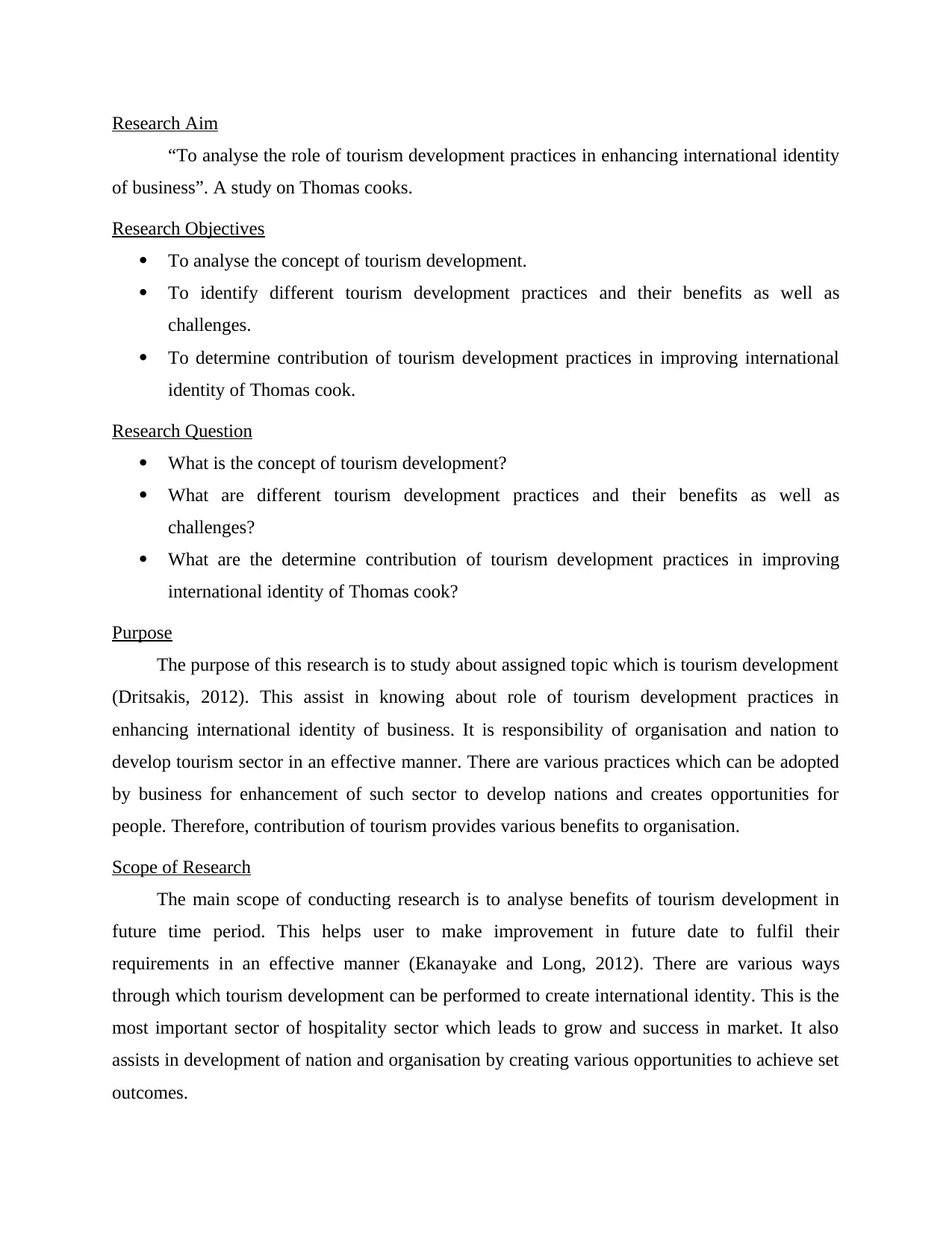
Research Aim
“To analyse the role of tourism development practices in enhancing international identity
of business”. A study on Thomas cooks.
Research Objectives
To analyse the concept of tourism development.
To identify different tourism development practices and their benefits as well as
challenges.
To determine contribution of tourism development practices in improving international
identity of Thomas cook.
Research Question
What is the concept of tourism development?
What are different tourism development practices and their benefits as well as
challenges?
What are the determine contribution of tourism development practices in improving
international identity of Thomas cook?
Purpose
The purpose of this research is to study about assigned topic which is tourism development
(Dritsakis, 2012). This assist in knowing about role of tourism development practices in
enhancing international identity of business. It is responsibility of organisation and nation to
develop tourism sector in an effective manner. There are various practices which can be adopted
by business for enhancement of such sector to develop nations and creates opportunities for
people. Therefore, contribution of tourism provides various benefits to organisation.
Scope of Research
The main scope of conducting research is to analyse benefits of tourism development in
future time period. This helps user to make improvement in future date to fulfil their
requirements in an effective manner (Ekanayake and Long, 2012). There are various ways
through which tourism development can be performed to create international identity. This is the
most important sector of hospitality sector which leads to grow and success in market. It also
assists in development of nation and organisation by creating various opportunities to achieve set
outcomes.
“To analyse the role of tourism development practices in enhancing international identity
of business”. A study on Thomas cooks.
Research Objectives
To analyse the concept of tourism development.
To identify different tourism development practices and their benefits as well as
challenges.
To determine contribution of tourism development practices in improving international
identity of Thomas cook.
Research Question
What is the concept of tourism development?
What are different tourism development practices and their benefits as well as
challenges?
What are the determine contribution of tourism development practices in improving
international identity of Thomas cook?
Purpose
The purpose of this research is to study about assigned topic which is tourism development
(Dritsakis, 2012). This assist in knowing about role of tourism development practices in
enhancing international identity of business. It is responsibility of organisation and nation to
develop tourism sector in an effective manner. There are various practices which can be adopted
by business for enhancement of such sector to develop nations and creates opportunities for
people. Therefore, contribution of tourism provides various benefits to organisation.
Scope of Research
The main scope of conducting research is to analyse benefits of tourism development in
future time period. This helps user to make improvement in future date to fulfil their
requirements in an effective manner (Ekanayake and Long, 2012). There are various ways
through which tourism development can be performed to create international identity. This is the
most important sector of hospitality sector which leads to grow and success in market. It also
assists in development of nation and organisation by creating various opportunities to achieve set
outcomes.
Paraphrase This Document
Need a fresh take? Get an instant paraphrase of this document with our AI Paraphraser
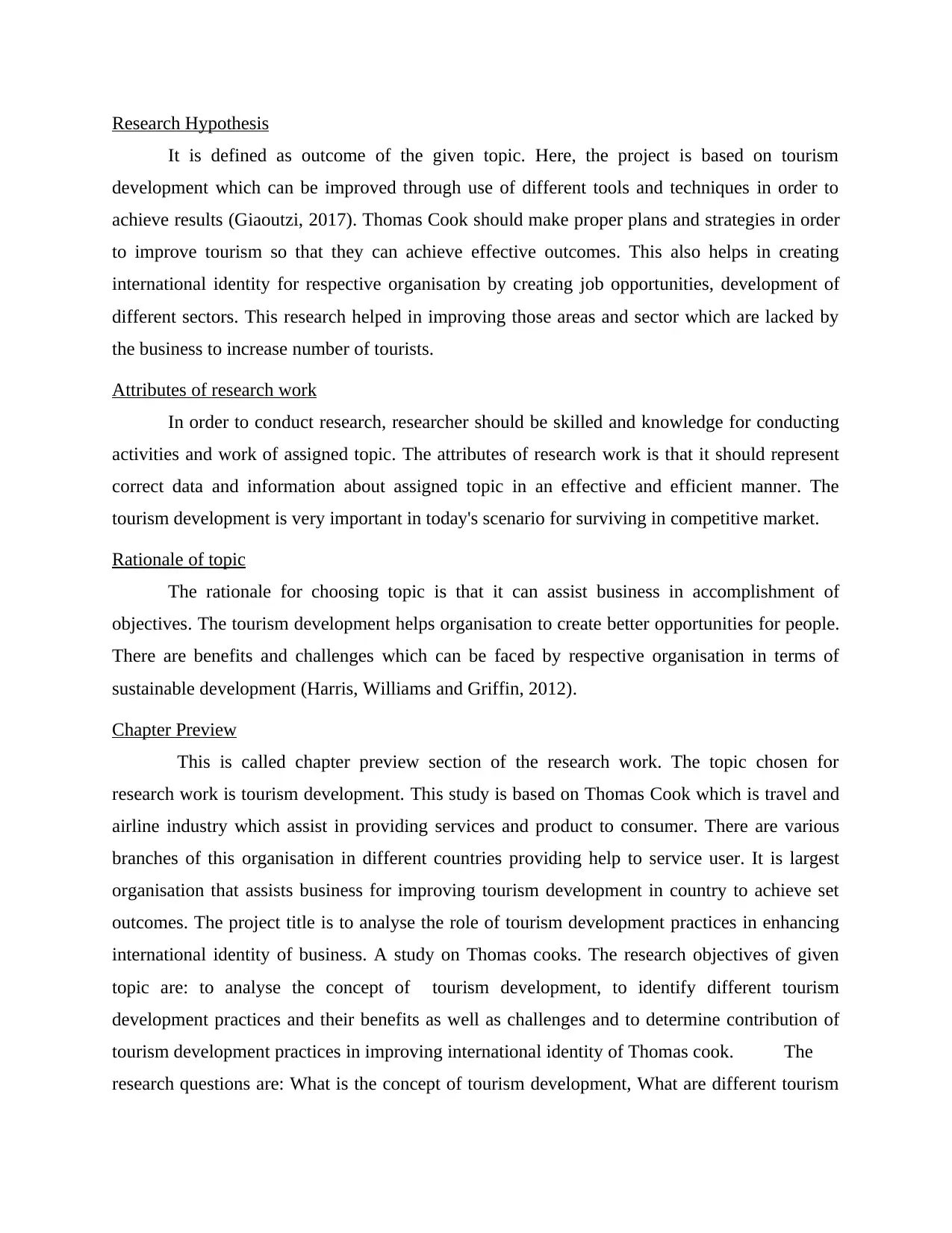
Research Hypothesis
It is defined as outcome of the given topic. Here, the project is based on tourism
development which can be improved through use of different tools and techniques in order to
achieve results (Giaoutzi, 2017). Thomas Cook should make proper plans and strategies in order
to improve tourism so that they can achieve effective outcomes. This also helps in creating
international identity for respective organisation by creating job opportunities, development of
different sectors. This research helped in improving those areas and sector which are lacked by
the business to increase number of tourists.
Attributes of research work
In order to conduct research, researcher should be skilled and knowledge for conducting
activities and work of assigned topic. The attributes of research work is that it should represent
correct data and information about assigned topic in an effective and efficient manner. The
tourism development is very important in today's scenario for surviving in competitive market.
Rationale of topic
The rationale for choosing topic is that it can assist business in accomplishment of
objectives. The tourism development helps organisation to create better opportunities for people.
There are benefits and challenges which can be faced by respective organisation in terms of
sustainable development (Harris, Williams and Griffin, 2012).
Chapter Preview
This is called chapter preview section of the research work. The topic chosen for
research work is tourism development. This study is based on Thomas Cook which is travel and
airline industry which assist in providing services and product to consumer. There are various
branches of this organisation in different countries providing help to service user. It is largest
organisation that assists business for improving tourism development in country to achieve set
outcomes. The project title is to analyse the role of tourism development practices in enhancing
international identity of business. A study on Thomas cooks. The research objectives of given
topic are: to analyse the concept of tourism development, to identify different tourism
development practices and their benefits as well as challenges and to determine contribution of
tourism development practices in improving international identity of Thomas cook. The
research questions are: What is the concept of tourism development, What are different tourism
It is defined as outcome of the given topic. Here, the project is based on tourism
development which can be improved through use of different tools and techniques in order to
achieve results (Giaoutzi, 2017). Thomas Cook should make proper plans and strategies in order
to improve tourism so that they can achieve effective outcomes. This also helps in creating
international identity for respective organisation by creating job opportunities, development of
different sectors. This research helped in improving those areas and sector which are lacked by
the business to increase number of tourists.
Attributes of research work
In order to conduct research, researcher should be skilled and knowledge for conducting
activities and work of assigned topic. The attributes of research work is that it should represent
correct data and information about assigned topic in an effective and efficient manner. The
tourism development is very important in today's scenario for surviving in competitive market.
Rationale of topic
The rationale for choosing topic is that it can assist business in accomplishment of
objectives. The tourism development helps organisation to create better opportunities for people.
There are benefits and challenges which can be faced by respective organisation in terms of
sustainable development (Harris, Williams and Griffin, 2012).
Chapter Preview
This is called chapter preview section of the research work. The topic chosen for
research work is tourism development. This study is based on Thomas Cook which is travel and
airline industry which assist in providing services and product to consumer. There are various
branches of this organisation in different countries providing help to service user. It is largest
organisation that assists business for improving tourism development in country to achieve set
outcomes. The project title is to analyse the role of tourism development practices in enhancing
international identity of business. A study on Thomas cooks. The research objectives of given
topic are: to analyse the concept of tourism development, to identify different tourism
development practices and their benefits as well as challenges and to determine contribution of
tourism development practices in improving international identity of Thomas cook. The
research questions are: What is the concept of tourism development, What are different tourism
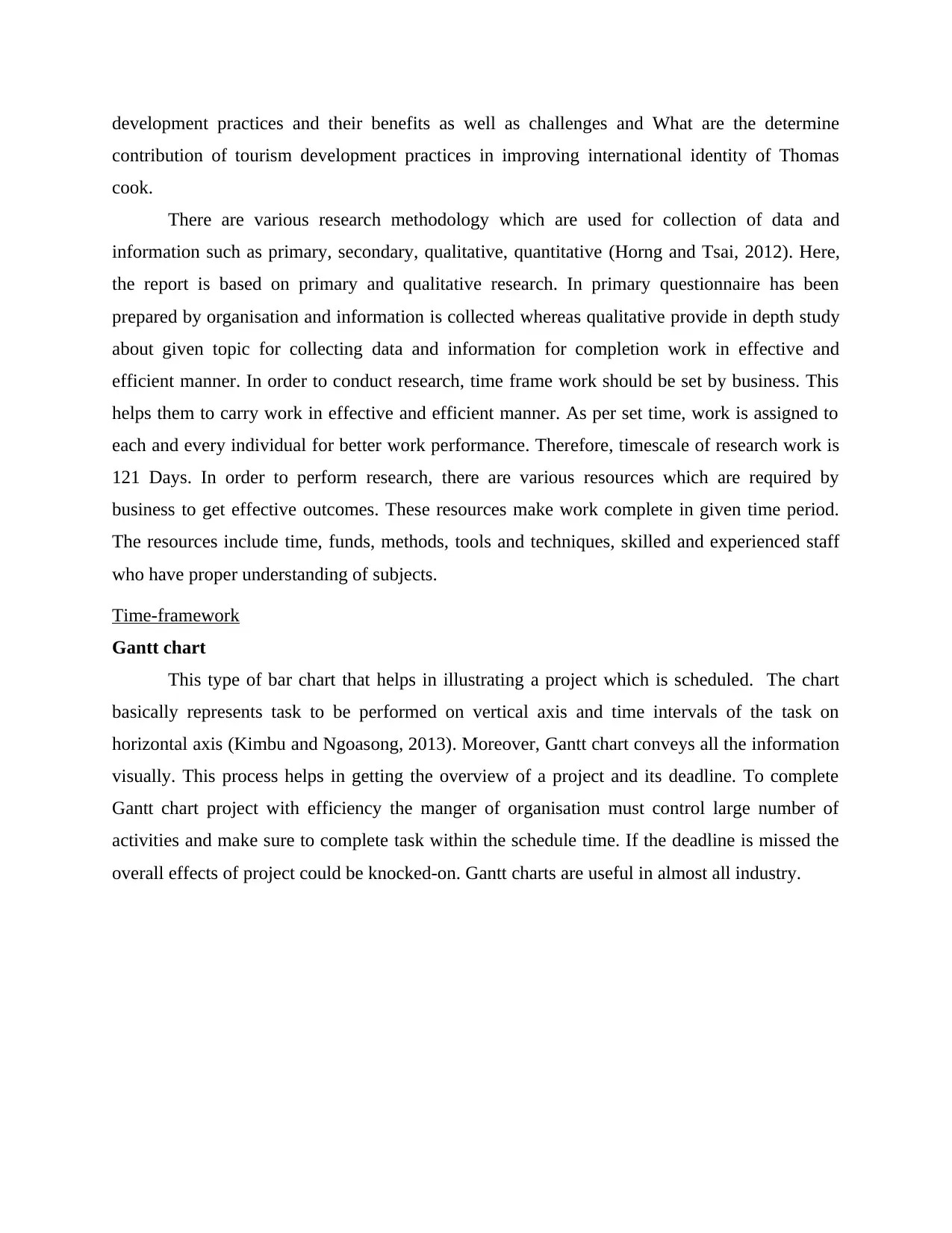
development practices and their benefits as well as challenges and What are the determine
contribution of tourism development practices in improving international identity of Thomas
cook.
There are various research methodology which are used for collection of data and
information such as primary, secondary, qualitative, quantitative (Horng and Tsai, 2012). Here,
the report is based on primary and qualitative research. In primary questionnaire has been
prepared by organisation and information is collected whereas qualitative provide in depth study
about given topic for collecting data and information for completion work in effective and
efficient manner. In order to conduct research, time frame work should be set by business. This
helps them to carry work in effective and efficient manner. As per set time, work is assigned to
each and every individual for better work performance. Therefore, timescale of research work is
121 Days. In order to perform research, there are various resources which are required by
business to get effective outcomes. These resources make work complete in given time period.
The resources include time, funds, methods, tools and techniques, skilled and experienced staff
who have proper understanding of subjects.
Time-framework
Gantt chart
This type of bar chart that helps in illustrating a project which is scheduled. The chart
basically represents task to be performed on vertical axis and time intervals of the task on
horizontal axis (Kimbu and Ngoasong, 2013). Moreover, Gantt chart conveys all the information
visually. This process helps in getting the overview of a project and its deadline. To complete
Gantt chart project with efficiency the manger of organisation must control large number of
activities and make sure to complete task within the schedule time. If the deadline is missed the
overall effects of project could be knocked-on. Gantt charts are useful in almost all industry.
contribution of tourism development practices in improving international identity of Thomas
cook.
There are various research methodology which are used for collection of data and
information such as primary, secondary, qualitative, quantitative (Horng and Tsai, 2012). Here,
the report is based on primary and qualitative research. In primary questionnaire has been
prepared by organisation and information is collected whereas qualitative provide in depth study
about given topic for collecting data and information for completion work in effective and
efficient manner. In order to conduct research, time frame work should be set by business. This
helps them to carry work in effective and efficient manner. As per set time, work is assigned to
each and every individual for better work performance. Therefore, timescale of research work is
121 Days. In order to perform research, there are various resources which are required by
business to get effective outcomes. These resources make work complete in given time period.
The resources include time, funds, methods, tools and techniques, skilled and experienced staff
who have proper understanding of subjects.
Time-framework
Gantt chart
This type of bar chart that helps in illustrating a project which is scheduled. The chart
basically represents task to be performed on vertical axis and time intervals of the task on
horizontal axis (Kimbu and Ngoasong, 2013). Moreover, Gantt chart conveys all the information
visually. This process helps in getting the overview of a project and its deadline. To complete
Gantt chart project with efficiency the manger of organisation must control large number of
activities and make sure to complete task within the schedule time. If the deadline is missed the
overall effects of project could be knocked-on. Gantt charts are useful in almost all industry.
⊘ This is a preview!⊘
Do you want full access?
Subscribe today to unlock all pages.

Trusted by 1+ million students worldwide
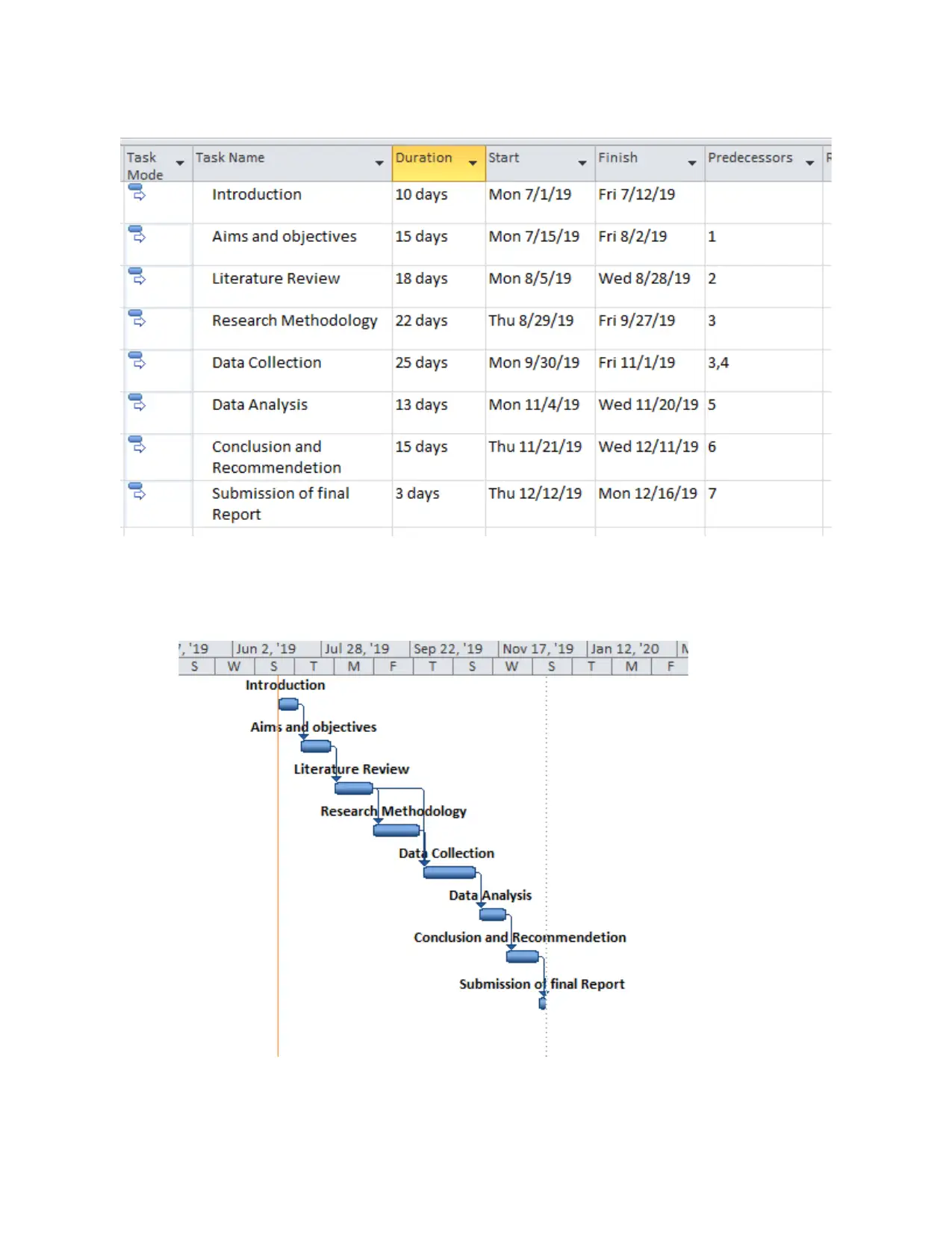
Paraphrase This Document
Need a fresh take? Get an instant paraphrase of this document with our AI Paraphraser
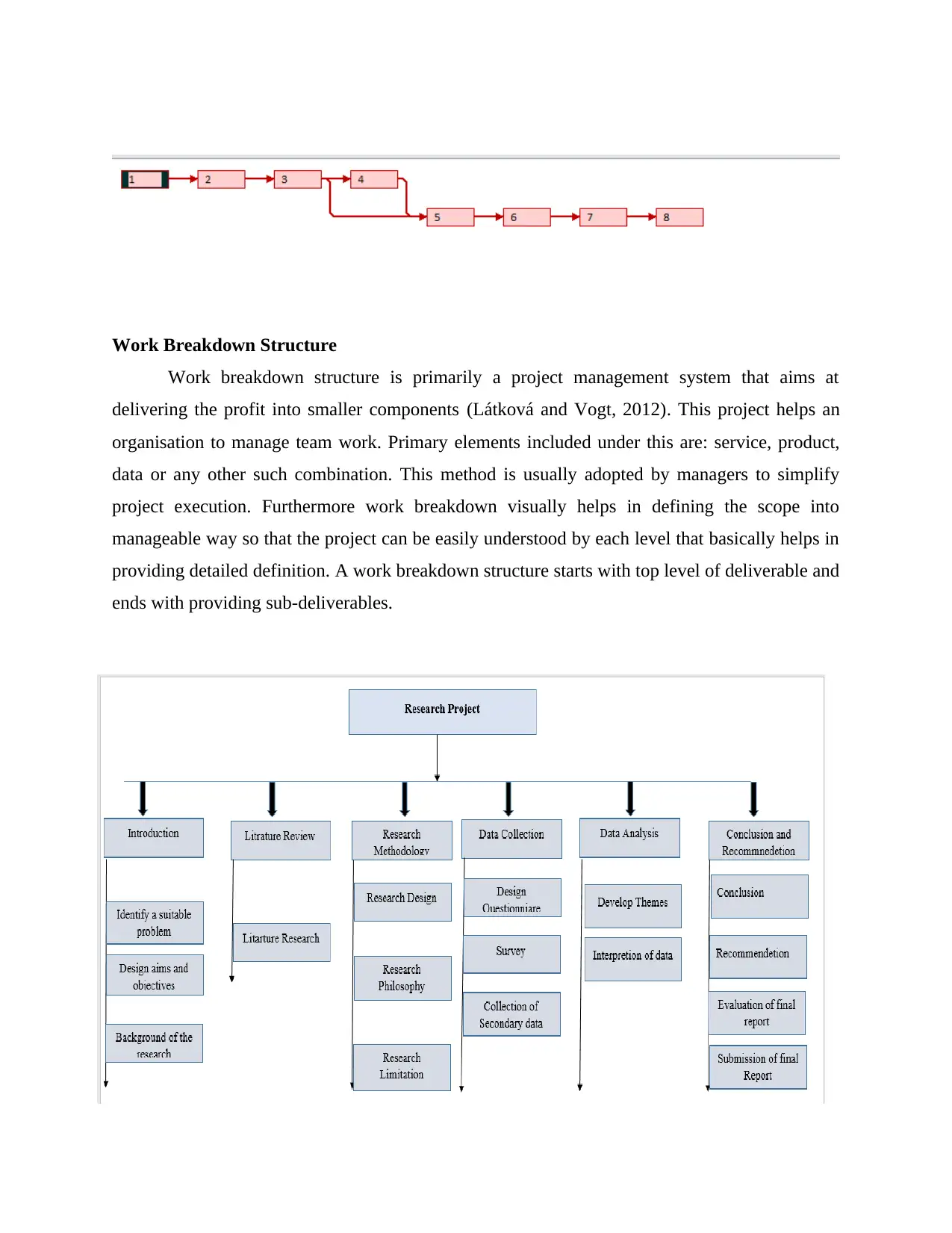
Work Breakdown Structure
Work breakdown structure is primarily a project management system that aims at
delivering the profit into smaller components (Látková and Vogt, 2012). This project helps an
organisation to manage team work. Primary elements included under this are: service, product,
data or any other such combination. This method is usually adopted by managers to simplify
project execution. Furthermore work breakdown visually helps in defining the scope into
manageable way so that the project can be easily understood by each level that basically helps in
providing detailed definition. A work breakdown structure starts with top level of deliverable and
ends with providing sub-deliverables.
Work breakdown structure is primarily a project management system that aims at
delivering the profit into smaller components (Látková and Vogt, 2012). This project helps an
organisation to manage team work. Primary elements included under this are: service, product,
data or any other such combination. This method is usually adopted by managers to simplify
project execution. Furthermore work breakdown visually helps in defining the scope into
manageable way so that the project can be easily understood by each level that basically helps in
providing detailed definition. A work breakdown structure starts with top level of deliverable and
ends with providing sub-deliverables.
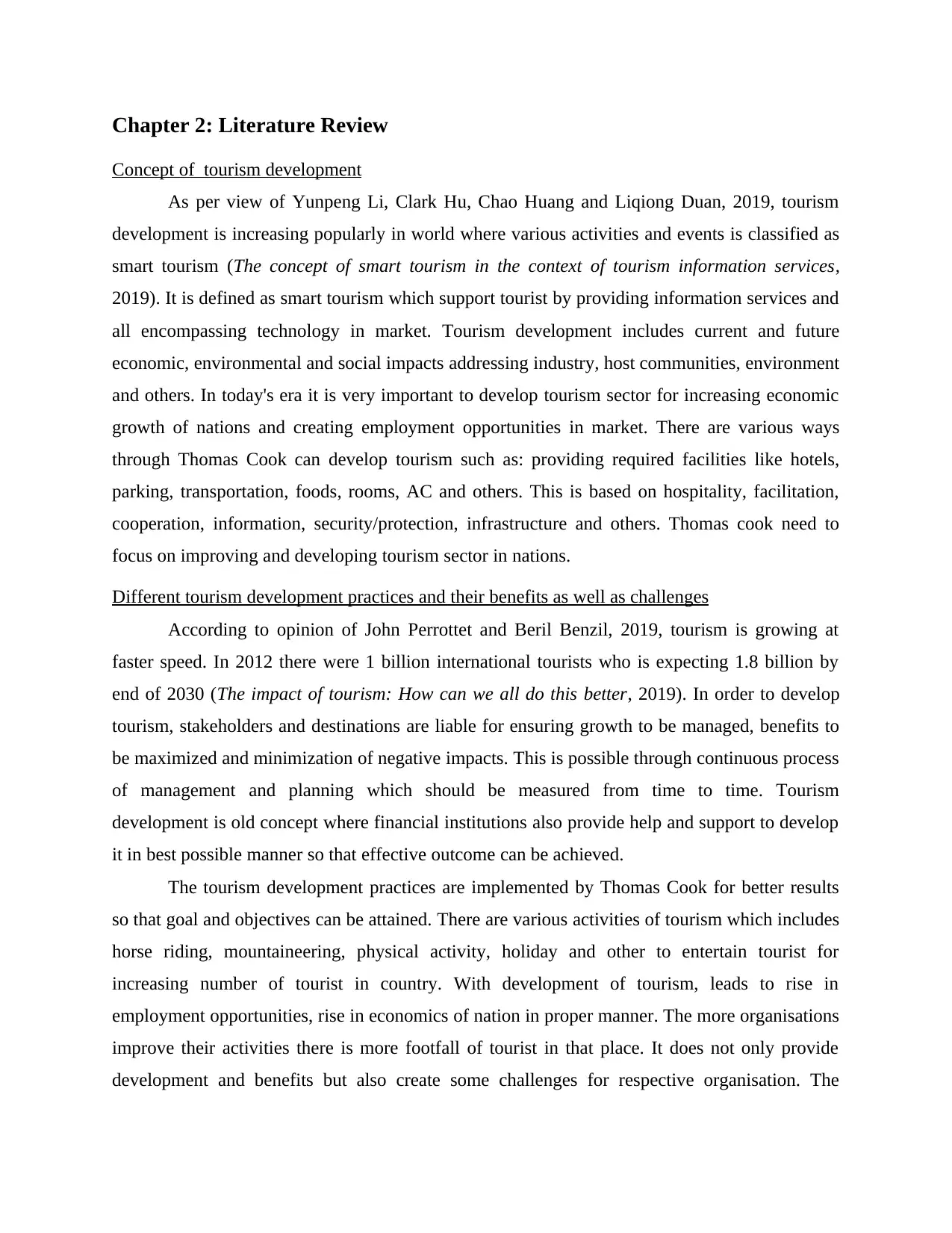
Chapter 2: Literature Review
Concept of tourism development
As per view of Yunpeng Li, Clark Hu, Chao Huang and Liqiong Duan, 2019, tourism
development is increasing popularly in world where various activities and events is classified as
smart tourism (The concept of smart tourism in the context of tourism information services,
2019). It is defined as smart tourism which support tourist by providing information services and
all encompassing technology in market. Tourism development includes current and future
economic, environmental and social impacts addressing industry, host communities, environment
and others. In today's era it is very important to develop tourism sector for increasing economic
growth of nations and creating employment opportunities in market. There are various ways
through Thomas Cook can develop tourism such as: providing required facilities like hotels,
parking, transportation, foods, rooms, AC and others. This is based on hospitality, facilitation,
cooperation, information, security/protection, infrastructure and others. Thomas cook need to
focus on improving and developing tourism sector in nations.
Different tourism development practices and their benefits as well as challenges
According to opinion of John Perrottet and Beril Benzil, 2019, tourism is growing at
faster speed. In 2012 there were 1 billion international tourists who is expecting 1.8 billion by
end of 2030 (The impact of tourism: How can we all do this better, 2019). In order to develop
tourism, stakeholders and destinations are liable for ensuring growth to be managed, benefits to
be maximized and minimization of negative impacts. This is possible through continuous process
of management and planning which should be measured from time to time. Tourism
development is old concept where financial institutions also provide help and support to develop
it in best possible manner so that effective outcome can be achieved.
The tourism development practices are implemented by Thomas Cook for better results
so that goal and objectives can be attained. There are various activities of tourism which includes
horse riding, mountaineering, physical activity, holiday and other to entertain tourist for
increasing number of tourist in country. With development of tourism, leads to rise in
employment opportunities, rise in economics of nation in proper manner. The more organisations
improve their activities there is more footfall of tourist in that place. It does not only provide
development and benefits but also create some challenges for respective organisation. The
Concept of tourism development
As per view of Yunpeng Li, Clark Hu, Chao Huang and Liqiong Duan, 2019, tourism
development is increasing popularly in world where various activities and events is classified as
smart tourism (The concept of smart tourism in the context of tourism information services,
2019). It is defined as smart tourism which support tourist by providing information services and
all encompassing technology in market. Tourism development includes current and future
economic, environmental and social impacts addressing industry, host communities, environment
and others. In today's era it is very important to develop tourism sector for increasing economic
growth of nations and creating employment opportunities in market. There are various ways
through Thomas Cook can develop tourism such as: providing required facilities like hotels,
parking, transportation, foods, rooms, AC and others. This is based on hospitality, facilitation,
cooperation, information, security/protection, infrastructure and others. Thomas cook need to
focus on improving and developing tourism sector in nations.
Different tourism development practices and their benefits as well as challenges
According to opinion of John Perrottet and Beril Benzil, 2019, tourism is growing at
faster speed. In 2012 there were 1 billion international tourists who is expecting 1.8 billion by
end of 2030 (The impact of tourism: How can we all do this better, 2019). In order to develop
tourism, stakeholders and destinations are liable for ensuring growth to be managed, benefits to
be maximized and minimization of negative impacts. This is possible through continuous process
of management and planning which should be measured from time to time. Tourism
development is old concept where financial institutions also provide help and support to develop
it in best possible manner so that effective outcome can be achieved.
The tourism development practices are implemented by Thomas Cook for better results
so that goal and objectives can be attained. There are various activities of tourism which includes
horse riding, mountaineering, physical activity, holiday and other to entertain tourist for
increasing number of tourist in country. With development of tourism, leads to rise in
employment opportunities, rise in economics of nation in proper manner. The more organisations
improve their activities there is more footfall of tourist in that place. It does not only provide
development and benefits but also create some challenges for respective organisation. The
⊘ This is a preview!⊘
Do you want full access?
Subscribe today to unlock all pages.

Trusted by 1+ million students worldwide
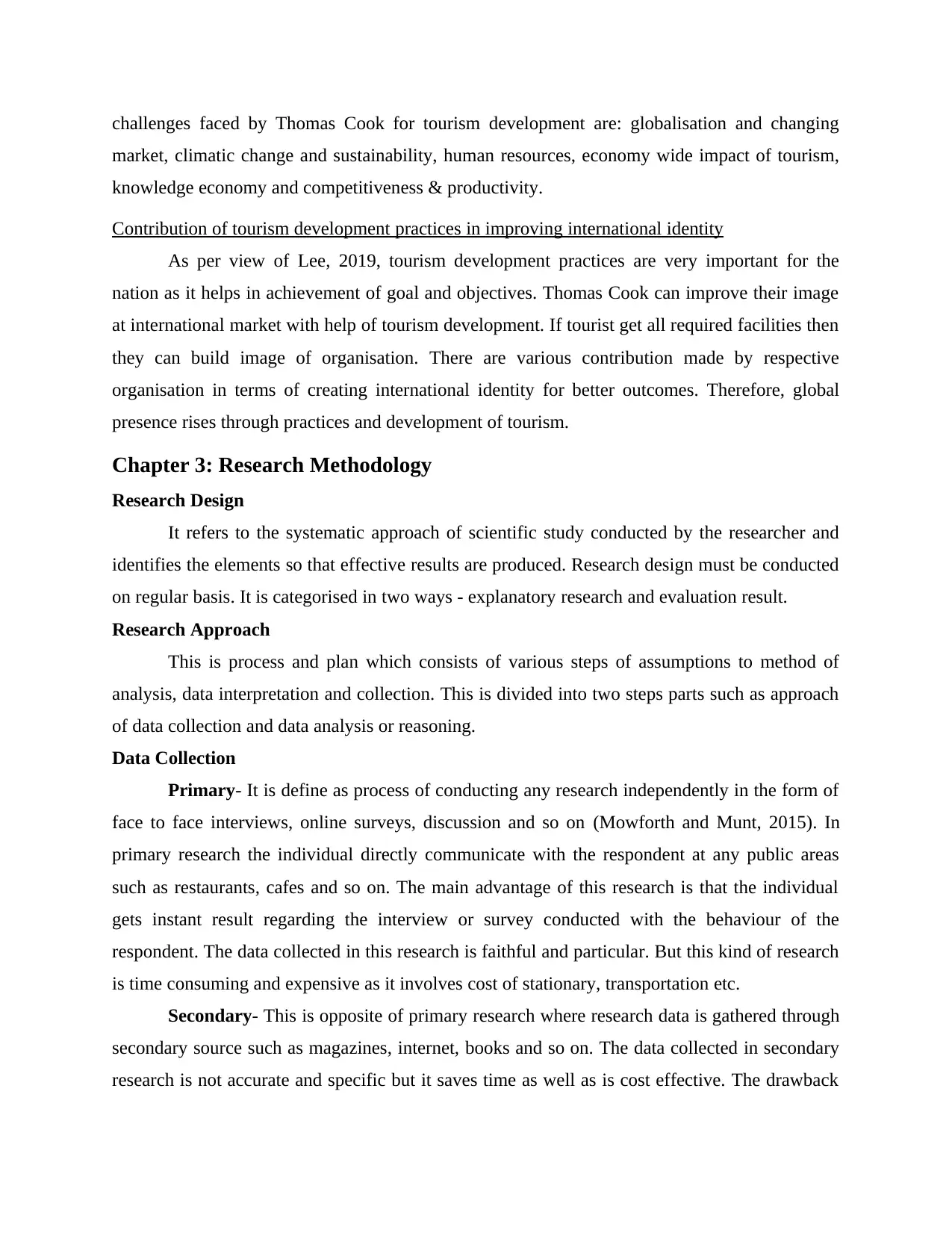
challenges faced by Thomas Cook for tourism development are: globalisation and changing
market, climatic change and sustainability, human resources, economy wide impact of tourism,
knowledge economy and competitiveness & productivity.
Contribution of tourism development practices in improving international identity
As per view of Lee, 2019, tourism development practices are very important for the
nation as it helps in achievement of goal and objectives. Thomas Cook can improve their image
at international market with help of tourism development. If tourist get all required facilities then
they can build image of organisation. There are various contribution made by respective
organisation in terms of creating international identity for better outcomes. Therefore, global
presence rises through practices and development of tourism.
Chapter 3: Research Methodology
Research Design
It refers to the systematic approach of scientific study conducted by the researcher and
identifies the elements so that effective results are produced. Research design must be conducted
on regular basis. It is categorised in two ways - explanatory research and evaluation result.
Research Approach
This is process and plan which consists of various steps of assumptions to method of
analysis, data interpretation and collection. This is divided into two steps parts such as approach
of data collection and data analysis or reasoning.
Data Collection
Primary- It is define as process of conducting any research independently in the form of
face to face interviews, online surveys, discussion and so on (Mowforth and Munt, 2015). In
primary research the individual directly communicate with the respondent at any public areas
such as restaurants, cafes and so on. The main advantage of this research is that the individual
gets instant result regarding the interview or survey conducted with the behaviour of the
respondent. The data collected in this research is faithful and particular. But this kind of research
is time consuming and expensive as it involves cost of stationary, transportation etc.
Secondary- This is opposite of primary research where research data is gathered through
secondary source such as magazines, internet, books and so on. The data collected in secondary
research is not accurate and specific but it saves time as well as is cost effective. The drawback
market, climatic change and sustainability, human resources, economy wide impact of tourism,
knowledge economy and competitiveness & productivity.
Contribution of tourism development practices in improving international identity
As per view of Lee, 2019, tourism development practices are very important for the
nation as it helps in achievement of goal and objectives. Thomas Cook can improve their image
at international market with help of tourism development. If tourist get all required facilities then
they can build image of organisation. There are various contribution made by respective
organisation in terms of creating international identity for better outcomes. Therefore, global
presence rises through practices and development of tourism.
Chapter 3: Research Methodology
Research Design
It refers to the systematic approach of scientific study conducted by the researcher and
identifies the elements so that effective results are produced. Research design must be conducted
on regular basis. It is categorised in two ways - explanatory research and evaluation result.
Research Approach
This is process and plan which consists of various steps of assumptions to method of
analysis, data interpretation and collection. This is divided into two steps parts such as approach
of data collection and data analysis or reasoning.
Data Collection
Primary- It is define as process of conducting any research independently in the form of
face to face interviews, online surveys, discussion and so on (Mowforth and Munt, 2015). In
primary research the individual directly communicate with the respondent at any public areas
such as restaurants, cafes and so on. The main advantage of this research is that the individual
gets instant result regarding the interview or survey conducted with the behaviour of the
respondent. The data collected in this research is faithful and particular. But this kind of research
is time consuming and expensive as it involves cost of stationary, transportation etc.
Secondary- This is opposite of primary research where research data is gathered through
secondary source such as magazines, internet, books and so on. The data collected in secondary
research is not accurate and specific but it saves time as well as is cost effective. The drawback
Paraphrase This Document
Need a fresh take? Get an instant paraphrase of this document with our AI Paraphraser
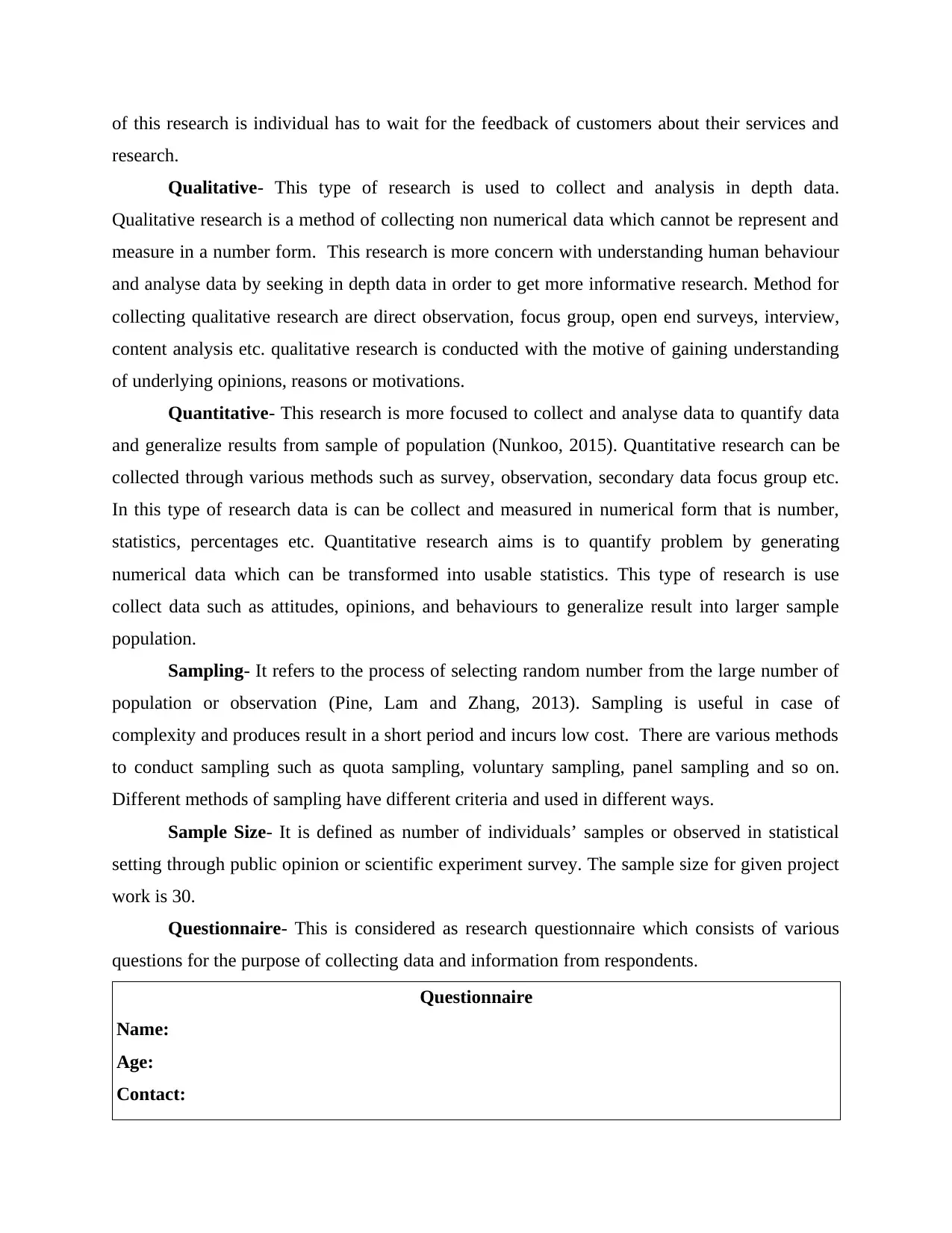
of this research is individual has to wait for the feedback of customers about their services and
research.
Qualitative- This type of research is used to collect and analysis in depth data.
Qualitative research is a method of collecting non numerical data which cannot be represent and
measure in a number form. This research is more concern with understanding human behaviour
and analyse data by seeking in depth data in order to get more informative research. Method for
collecting qualitative research are direct observation, focus group, open end surveys, interview,
content analysis etc. qualitative research is conducted with the motive of gaining understanding
of underlying opinions, reasons or motivations.
Quantitative- This research is more focused to collect and analyse data to quantify data
and generalize results from sample of population (Nunkoo, 2015). Quantitative research can be
collected through various methods such as survey, observation, secondary data focus group etc.
In this type of research data is can be collect and measured in numerical form that is number,
statistics, percentages etc. Quantitative research aims is to quantify problem by generating
numerical data which can be transformed into usable statistics. This type of research is use
collect data such as attitudes, opinions, and behaviours to generalize result into larger sample
population.
Sampling- It refers to the process of selecting random number from the large number of
population or observation (Pine, Lam and Zhang, 2013). Sampling is useful in case of
complexity and produces result in a short period and incurs low cost. There are various methods
to conduct sampling such as quota sampling, voluntary sampling, panel sampling and so on.
Different methods of sampling have different criteria and used in different ways.
Sample Size- It is defined as number of individuals’ samples or observed in statistical
setting through public opinion or scientific experiment survey. The sample size for given project
work is 30.
Questionnaire- This is considered as research questionnaire which consists of various
questions for the purpose of collecting data and information from respondents.
Questionnaire
Name:
Age:
Contact:
research.
Qualitative- This type of research is used to collect and analysis in depth data.
Qualitative research is a method of collecting non numerical data which cannot be represent and
measure in a number form. This research is more concern with understanding human behaviour
and analyse data by seeking in depth data in order to get more informative research. Method for
collecting qualitative research are direct observation, focus group, open end surveys, interview,
content analysis etc. qualitative research is conducted with the motive of gaining understanding
of underlying opinions, reasons or motivations.
Quantitative- This research is more focused to collect and analyse data to quantify data
and generalize results from sample of population (Nunkoo, 2015). Quantitative research can be
collected through various methods such as survey, observation, secondary data focus group etc.
In this type of research data is can be collect and measured in numerical form that is number,
statistics, percentages etc. Quantitative research aims is to quantify problem by generating
numerical data which can be transformed into usable statistics. This type of research is use
collect data such as attitudes, opinions, and behaviours to generalize result into larger sample
population.
Sampling- It refers to the process of selecting random number from the large number of
population or observation (Pine, Lam and Zhang, 2013). Sampling is useful in case of
complexity and produces result in a short period and incurs low cost. There are various methods
to conduct sampling such as quota sampling, voluntary sampling, panel sampling and so on.
Different methods of sampling have different criteria and used in different ways.
Sample Size- It is defined as number of individuals’ samples or observed in statistical
setting through public opinion or scientific experiment survey. The sample size for given project
work is 30.
Questionnaire- This is considered as research questionnaire which consists of various
questions for the purpose of collecting data and information from respondents.
Questionnaire
Name:
Age:
Contact:
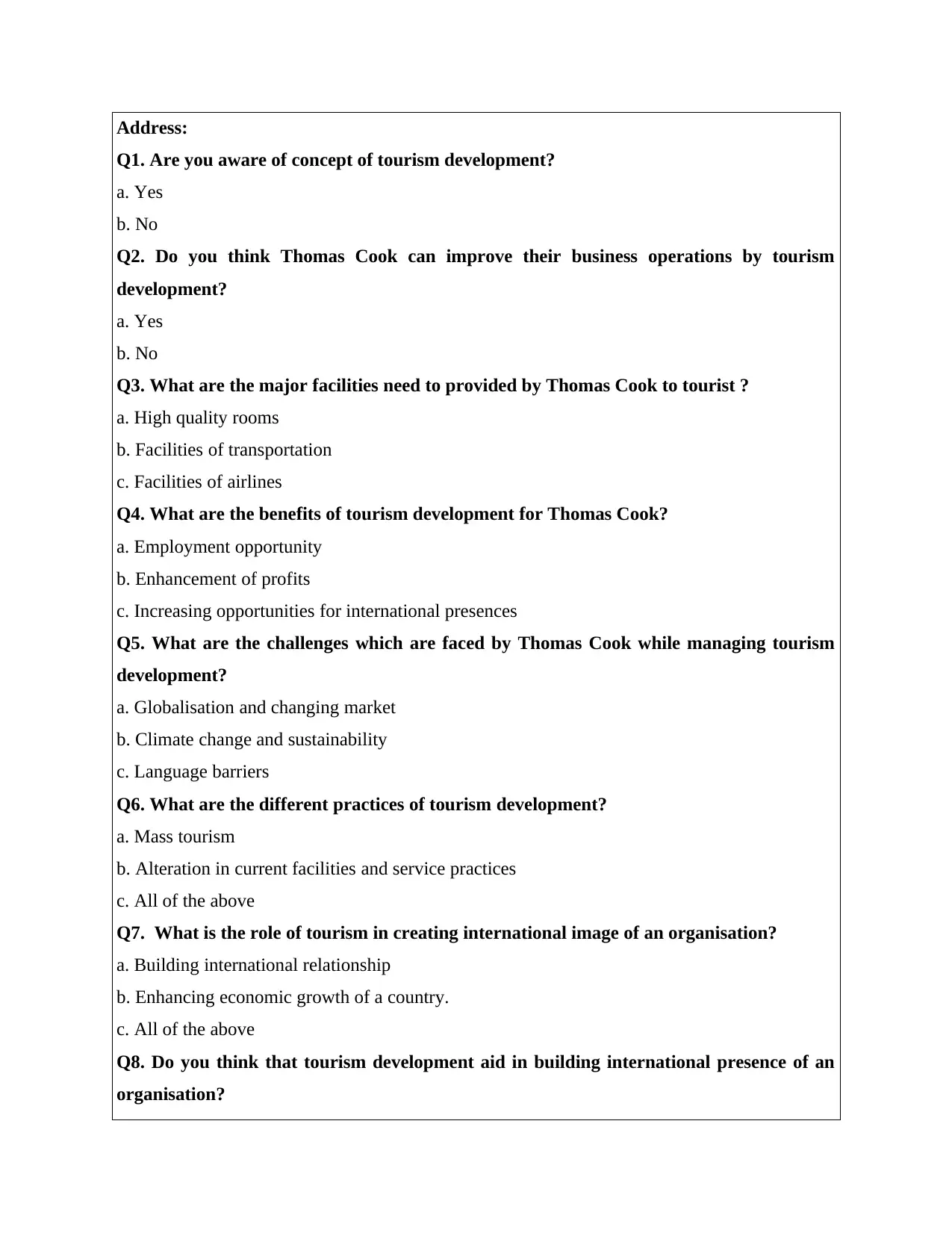
Address:
Q1. Are you aware of concept of tourism development?
a. Yes
b. No
Q2. Do you think Thomas Cook can improve their business operations by tourism
development?
a. Yes
b. No
Q3. What are the major facilities need to provided by Thomas Cook to tourist ?
a. High quality rooms
b. Facilities of transportation
c. Facilities of airlines
Q4. What are the benefits of tourism development for Thomas Cook?
a. Employment opportunity
b. Enhancement of profits
c. Increasing opportunities for international presences
Q5. What are the challenges which are faced by Thomas Cook while managing tourism
development?
a. Globalisation and changing market
b. Climate change and sustainability
c. Language barriers
Q6. What are the different practices of tourism development?
a. Mass tourism
b. Alteration in current facilities and service practices
c. All of the above
Q7. What is the role of tourism in creating international image of an organisation?
a. Building international relationship
b. Enhancing economic growth of a country.
c. All of the above
Q8. Do you think that tourism development aid in building international presence of an
organisation?
Q1. Are you aware of concept of tourism development?
a. Yes
b. No
Q2. Do you think Thomas Cook can improve their business operations by tourism
development?
a. Yes
b. No
Q3. What are the major facilities need to provided by Thomas Cook to tourist ?
a. High quality rooms
b. Facilities of transportation
c. Facilities of airlines
Q4. What are the benefits of tourism development for Thomas Cook?
a. Employment opportunity
b. Enhancement of profits
c. Increasing opportunities for international presences
Q5. What are the challenges which are faced by Thomas Cook while managing tourism
development?
a. Globalisation and changing market
b. Climate change and sustainability
c. Language barriers
Q6. What are the different practices of tourism development?
a. Mass tourism
b. Alteration in current facilities and service practices
c. All of the above
Q7. What is the role of tourism in creating international image of an organisation?
a. Building international relationship
b. Enhancing economic growth of a country.
c. All of the above
Q8. Do you think that tourism development aid in building international presence of an
organisation?
⊘ This is a preview!⊘
Do you want full access?
Subscribe today to unlock all pages.

Trusted by 1+ million students worldwide
1 out of 23
Related Documents
Your All-in-One AI-Powered Toolkit for Academic Success.
+13062052269
info@desklib.com
Available 24*7 on WhatsApp / Email
![[object Object]](/_next/static/media/star-bottom.7253800d.svg)
Unlock your academic potential
Copyright © 2020–2026 A2Z Services. All Rights Reserved. Developed and managed by ZUCOL.




